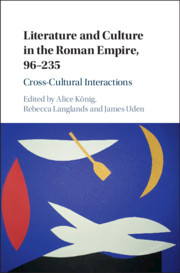Book contents
- Literature and Culture in the Roman Empire, 96–235
- Literature and Culture in the Roman Empire, 96–235
- Copyright page
- Contents
- Figures
- Contributors
- Preface
- Timeline
- Abbreviations
- Map
- Introduction
- Part I Refiguring Roman and Greek Interactions
- Part II Imperial Infrastructure: Documents and Monuments
- Part III Cultural Translation and Transformation
- Chapter 13 Bardaisan’s Disciples and Ethnographic Knowledge in the Roman Empire
- Chapter 14 Chaldean Interactions
- Chapter 15 Gilgamos in Rome
- Afterword
- References
- Index
Chapter 14 - Chaldean Interactions
from Part III - Cultural Translation and Transformation
Published online by Cambridge University Press: 28 April 2020
- Literature and Culture in the Roman Empire, 96–235
- Literature and Culture in the Roman Empire, 96–235
- Copyright page
- Contents
- Figures
- Contributors
- Preface
- Timeline
- Abbreviations
- Map
- Introduction
- Part I Refiguring Roman and Greek Interactions
- Part II Imperial Infrastructure: Documents and Monuments
- Part III Cultural Translation and Transformation
- Chapter 13 Bardaisan’s Disciples and Ethnographic Knowledge in the Roman Empire
- Chapter 14 Chaldean Interactions
- Chapter 15 Gilgamos in Rome
- Afterword
- References
- Index
Summary
This chapter looks at the Chaldean Oracles, a set of hexameter texts from the Antonine period which develop an ambitious system of Platonising theurgy. Scholars have long appreciated the importance of this corpus for the development of Neoplatonic philosophy, and late paganism more generally, but have had less to say about its place in the history of Chaldean thought – the topic of this chapter. It first traces the history of what ancient observers called the ‘philosophy’ of the Chaldeans in relation to developments in Greek philosophical thought. It then shows how the Oracles attempt to reform the Chaldean brand in response to the rise of Platonism. Finally, it places the Oracles in the cultural and intellectual context of Syria during the Antonine period. Chaldeanism emerges from this argument as a non-Greek tradition that interacted closely with the major Greek philosophical schools of its time.
Keywords
- Type
- Chapter
- Information
- Literature and Culture in the Roman Empire, 96–235Cross-Cultural Interactions, pp. 309 - 327Publisher: Cambridge University PressPrint publication year: 2020

